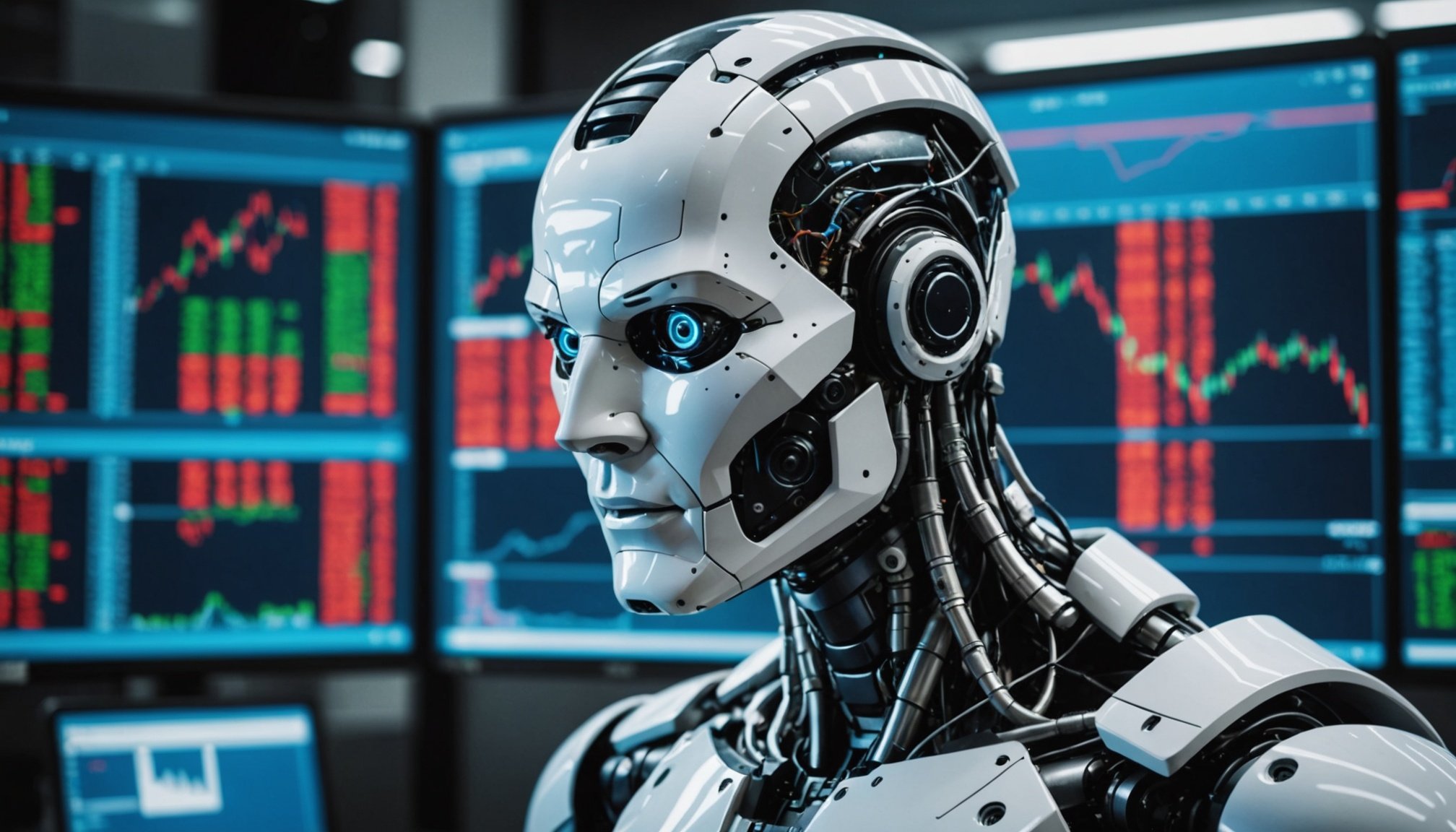Transforming Stock Trading: The Impact of AI Algorithms on Instant Decision-Making
The world of stock trading has undergone a significant transformation in recent years, and one of the key drivers of this change is the integration of Artificial Intelligence (AI) algorithms. These advanced technologies are revolutionizing the way traders analyze data, make decisions, and execute trades. In this article, we will delve into the impact of AI on stock trading, exploring how it enhances decision-making, manages risk, and democratizes access to sophisticated trading tools.
A Revolution in Financial Decision-Making
AI is not just a buzzword in the financial sector; it is a game-changer. Traditional methods of analyzing financial data, which relied heavily on human analysts, are being rapidly replaced by AI-driven systems. These systems can process vast amounts of data in real-time, identifying trends, predicting market movements, and automating complex trading strategies.
Additional reading : Revolutionize video creation with text to video ai today
“For instance, platforms like Bloomberg Terminal use AI algorithms to provide predictive analytics to professional investors. These algorithms can scan thousands of news articles, financial data, and social media posts in real-time to identify weak signals that may indicate market trends,” explains an analyst from Elior Finance[1].
Redefining Financial Data Analysis
The ability of AI to transform big data into actionable insights almost instantaneously is a significant advantage over traditional methods. Here are some key ways AI is redefining financial data analysis:
Have you seen this : Evernex: innovative it solutions for cost savings and sustainability
- Sentiment Analysis: AI-powered systems use Natural Language Processing (NLP) to analyze market sentiment from news articles, social media, and other sources. This helps in identifying market trends and potential risks.
- Predictive Analytics: AI algorithms can predict market movements by analyzing historical data and real-time market conditions. This predictive capability is crucial for making informed investment decisions.
- Automated Trading: AI-driven trading systems, or robo-advisors, can execute trades based on predefined strategies without human intervention, reducing the impact of emotional biases.
“More than 60% of hedge funds are now actively using AI or automated tools to define their strategies. For example, Renaissance Technologies, a quantitative fund, uses complex algebraic algorithms to consistently outperform standard market returns,” notes a report from Elior Finance[1].
Democratization of Advanced Trading Tools
The integration of AI has made advanced trading tools accessible to a broader audience, including individual investors. Here’s how this democratization is shaping the trading landscape:
- Fintech Platforms: Applications like eToro and Robinhood integrate AI predictive tools, allowing individual investors to benefit from advanced analysis and automated trading strategies.
- Robo-Advisors: Services such as Wealthfront and Betterment use AI algorithms to provide automated investment advice, portfolio rebalancing, and tax optimization. These services have become increasingly popular in the retail market[1].
| Feature | Traditional Trading | AI-Driven Trading |
|---|---|---|
| Data Analysis | Manual analysis by human analysts | Automated analysis by AI algorithms |
| Speed | Slow, dependent on human processing | Fast, real-time processing |
| Emotional Bias | High risk of emotional biases | Low risk, objective decision-making |
| Accessibility | Limited to institutional investors | Accessible to individual investors |
| Risk Management | Manual risk assessment | Automated risk management |
| Market Coverage | Limited to specific markets | Global market coverage, 24/7 |
The Influence on Trader Psychology
AI not only changes the tools available to traders but also influences their psychological approach to trading. Here are some key psychological impacts:
- Reduced Emotional Bias: AI-driven trading systems eliminate the influence of emotional reactions to economic news or geopolitical events. “These systems act purely objectively, reducing the impact of impulsive decisions,” notes an expert from Stradoji[3].
- Increased Confidence: With AI handling complex analyses and executions, traders can feel more confident in their investment decisions, knowing that they are based on objective data rather than emotional responses.
Ethical and Regulatory Challenges
While AI promises to enhance investment performance, its rapid adoption also introduces significant ethical and regulatory risks. Here are some of the challenges:
- Systemic Risks: Over-reliance on AI could lead to homogenization of investment strategies, amplifying market fluctuations and creating systemic risks. “If too many users follow the same automated recommendations, it could lead to herd behavior, exacerbating market volatility,” warns an analyst from Elior Finance[1].
- Regulatory Gaps: The use of sophisticated algorithms by institutional investors could widen the gap between institutional and individual investors, creating an uneven playing field. “Regulatory bodies need to address these disparities to ensure fair market practices,” advises a financial expert.
Practical Insights and Actionable Advice
For traders looking to leverage AI algorithms, here are some practical insights and actionable advice:
Choosing the Right AI Trading System
- Evaluate the Algorithm: Ensure the AI algorithm is robust and adaptable to changing market conditions. A well-designed algorithm can adjust to unexpected market changes, unlike simpler bots that may fail to open positions in volatile markets[3].
- Backtesting: Perform thorough backtests on the algorithm using historical data to determine its performance under various market conditions. This includes in-sample, out-of-sample, and Monte Carlo simulations[3].
Managing Risk
- Diversification: Use AI to diversify your investments across multiple assets. This can help mitigate risk by spreading investments across different market sectors.
- Risk Management Tools: Utilize AI-driven risk management tools to set stop-loss orders and limit exposure to potential losses.
Balancing Human and AI Decision-Making
- Hybrid Approach: Combine human judgment with AI-driven insights. While AI can handle complex data analysis, human intuition and experience are invaluable in making strategic decisions.
- Continuous Learning: Stay updated with the latest developments in AI and machine learning to ensure you are using the most advanced and effective tools.
Real-World Examples and Success Stories
Several companies and funds have already seen significant success with AI-driven trading strategies:
- Vantard: Vantard’s AI-powered investment platform has demonstrated its efficacy by capitalizing on trends in the cryptocurrency market. By integrating AI, Vantard has been able to identify and invest in meme coins before they become viral, resulting in substantial gains for its investors[2].
- Renaissance Technologies: This quantitative fund has consistently outperformed the market using complex AI algorithms. Their approach highlights the potential of AI in achieving superior investment returns[1].
The integration of AI algorithms in stock trading is a transformative force that enhances decision-making, automates complex strategies, and democratizes access to advanced trading tools. However, it is crucial to approach this technology with a balanced perspective, understanding both its benefits and its limitations.
“As AI continues to evolve, it is essential for traders to remain cautious and critical. The key lies in leveraging technological advancements while maintaining a human touch in decision-making,” advises a financial analyst.
By embracing AI in a thoughtful and informed manner, traders can navigate the complexities of the stock market more effectively, making better-informed decisions and managing risk more efficiently. The future of stock trading is undoubtedly tied to the advancements in AI, and those who adapt to these changes will be better positioned to succeed in the dynamic and ever-evolving financial markets.





